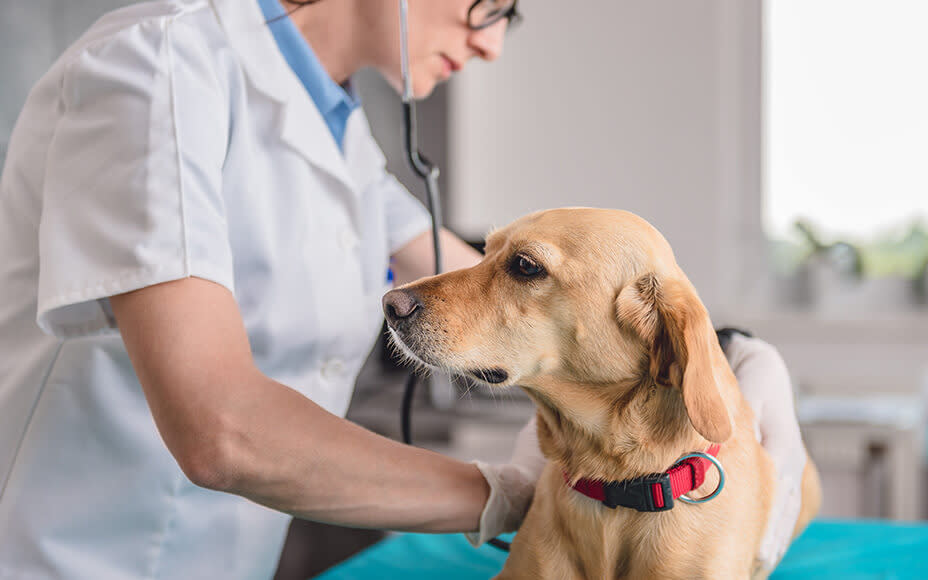Just like humans, dogs can suffer from various liver diseases. Learn more about symptoms, common liver diseases, and available treatments.
Why Do Dogs Need Their Liver?
The liver is one of the most crucial metabolic organs in our dogs. It consists of multiple lobes and is located in the abdomen just behind the stomach, closely associated with the gallbladder. Substances absorbed from the intestines into the bloodstream reach the liver through the portal vein. Depending on the substance, the liver either processes, stores, transforms, or breaks it down – making the liver a versatile organ.
The liver performs several functions, including:
- Storage of sugar, fat, vitamins, providing them to the body when needed
- Synthesis of proteins such as albumin and clotting factors
- Synthesis of bile acids, cholesterol
- Breakdown of ammonia, a toxic byproduct of protein metabolism, into urea, which is excreted in urine
- Breakdown of aged blood cells
- Detoxification of drugs, toxins, hormones
How Do Liver Problems Manifest in Dogs?
As you’ve learned, the liver has various functions and is involved in many metabolic processes. Therefore, the symptoms of liver disease are diverse and nonspecific.
Common symptoms of liver diseases include:
If you notice any of these symptoms in your dog, prompt veterinary advice is recommended.

What Liver Diseases Exist?
There are numerous liver diseases with different causes. The following liver diseases are common:
Congenital Diseases
One congenital liver disease in dogs is the portosystemic shunt, a malformation of liver vessels. Blood coming from the intestines, enriched with absorbed substances, does not reach the liver for processing but directly enters the systemic circulation. This leads to the presence of toxic substances like ammonia in the body, resulting in severe symptoms such as seizures. This condition is more common in puppies and young dogs.
Another congenital disease is copper storage disease. It involves a genetic defect that causes excessive copper storage in the liver, leading to chronic liver inflammation. Some breeds are more susceptible, including:
- Bedlington Terrier
- West Highland White Terrier
- Dalmatian
- Doberman
- Labrador

Hepatitis (Liver Inflammation)
Causes of hepatitis include:
- Bacteria
- Viruses such as Canine Adenovirus 1 (CAV-1)
- Parasites
- Single-celled organisms
- Poisoning (e.g., Xylitol, medications)
- Tumors
- Pancreatitis
Hepatitis can be acute or chronic, and the treatment depends on the underlying cause. Canine Adenovirus 1 (CAV-1) causes Infectious Canine Hepatitis, a generalized viral infection. Vaccination is available for this virus; consult with your veterinarian for guidance.
Liver Tumors
Unfortunately, our furry companions are not immune to tumors. Liver tumors can either originate in the liver or be secondary due to metastases.
Liver Cirrhosis
Liver cirrhosis represents the end stage of chronic liver diseases, where the liver structure and function are irreversibly altered due to persistent damage.
Despite the liver’s significant regenerative potential, the damage caused by cirrhosis cannot be repaired.
How Are Liver Diseases Diagnosed?
After describing your pet’s symptoms and condition, your veterinarian will initiate a clinical examination. Since symptoms of liver diseases are diverse and often nonspecific, the next step usually involves a blood test. This test evaluates blood cells, liver enzymes, and other values.
Imaging techniques such as ultrasound or X-rays are often necessary. In some cases, additional imaging methods like CT or MRI may be required, especially for conditions like portosystemic shunt. If a tumor or other structural changes in the liver are suspected, your veterinarian may perform a biopsy to examine liver tissue under a microscope.

What Do Elevated Liver Values Mean?
In a blood test, several values are usually assessed, many of which you may not be familiar with. Your veterinarian will discuss your pet’s blood results in detail, explaining the significance of elevated or decreased liver values.
Here’s a brief overview of common liver values:
Liver Enzymes
Liver enzymes are sensitive indicators of liver diseases. However, they can also change in other illnesses and are not specific to liver diseases. They also do not provide information about liver function.
Common liver enzymes include:
- Alanine Aminotransferase (ALT), a good indicator of liver diseases
- Alkaline Phosphatase (AP), which can also increase in other diseases like Cushing’s syndrome or diabetes mellitus
- Gamma-Glutamyltransferase (GGT), an important indicator for liver problems in cats
- Aspartate Aminotransferase (AST), present not only in the liver but also in muscles and red blood cells, making changes non-specific
- Glutamate Dehydrogenase (GLDH), elevated in hepatitis and poisonings with liver-toxic substances
Synthesis Products of the Liver
These include substances synthesized by the liver:
- Albumin
- Urea
- Glucose
- Clotting factors
Decreased levels may indicate impaired liver function.
Metabolites of the Liver
These include:
- Bilirubin
- Bile acids
- Ammonia
Changes in these values provide insights into liver function.
How Are Liver Diseases Treated?
The treatment of liver problems depends on the underlying cause. Antibiotics help with bacterial infections, while surgery may be beneficial for a tumor or portosystemic shunt. Symptomatic therapy may involve infusion therapy to ensure adequate fluid supply. There are also medications that can support the liver, and a low-protein diet is advantageous. Your veterinarian will choose the right treatment for your pet.

Preventing Liver Diseases
Unfortunately, preventive measures may not cover all liver diseases. Regular vaccinations and deworming, however, protect your pet against some infectious causes of liver diseases.
A healthy diet can prevent liver fat accumulation and is essential for a long, happy canine life. If you’re unsure about the right food for your dog, you can get free advice from us. Thanks to our convenient trial packages, you can try out various pet foods.


